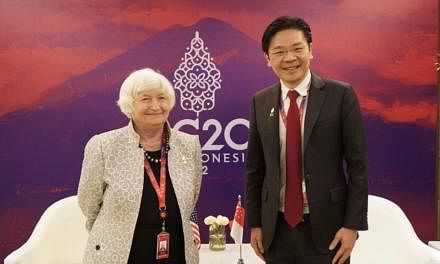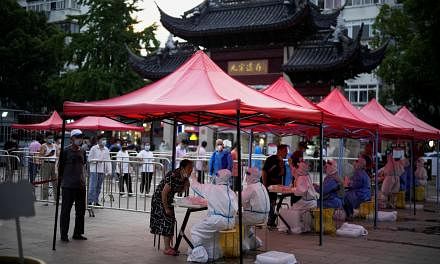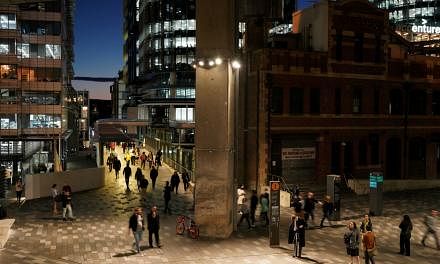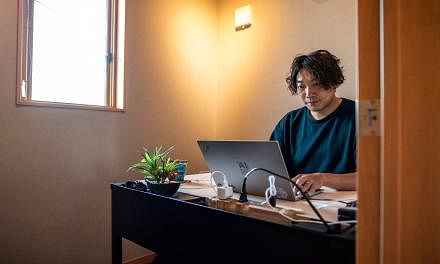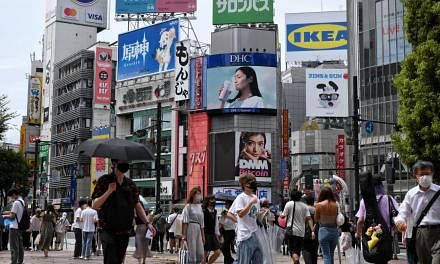SINGAPORE - Fresh waves of Covid-19 infections around the world have spurred governments to introduce social restrictions in a move to control the outbreaks, dampening the otherwise festive Christmas season, particularly in Europe.
Measures rolled out include limiting the number of attendees in gatherings, shutting down bars and restaurants except for takeouts, and introducing curfews.
The tougher measures come as infections spike in countries such as South Korea, the United States and Britain.
Here are the measures that some countries have taken to cope with the pandemic:
United Kingdom
Prime Minister Boris Johnson on Saturday (Dec 19) announced a "stay at home" order for London and south-east England to slow a new coronavirus strain that is significantly more infectious.
The new strain of the virus "does appear to be passed on significantly more easily", Mr Johnson said at a televised briefing.
He ordered new restrictions for London and south-eastern England from today, saying that under the new "tier four" rules, "residents in those areas must stay at home" at least until Dec 30.
Under tier four, all non-essential shops will be closed, and all foreign travel banned except for essential purposes.
Mr Johnson, after emergency talks with his most senior officials, cancelled plans to ease pandemic restrictions for five days during the holiday.
Household mixing will be banned in London and the south-east and socialising is restricted to just Christmas Day across the rest of England.
Germany
Europe's largest economy entered a lockdown last Wednesday to try and bring soaring coronavirus cases under control as fears mount that the pandemic is spiralling out of control, reported Reuters.
Chancellor Angela Merkel and the 16 state governors announced last Sunday a tough lockdown until Jan 10 at the earliest.
Dr Merkel on Saturday urged Germans to avoid visiting family members over Christmas and to use video calls instead for greetings.
Shops and schools have been shut since last Wednesday, in a pre-Christmas tightening of restrictions following a partial lockdown last month, which closed bars and restaurants but failed to contain a second wave of the pandemic.
France
Boutiques in the centre of Paris shut early and shoppers hurried home to meet a new 8pm curfew last Tuesday, to try to prevent a new spike in Covid-19 infections, Reuters reported.
The government replaced a stay-at-home order with the nightly curfew.
From 8pm until 6am, people can go out only for work, on official business, or for medical reasons. Anyone breaking curfew is liable for a €135 (S$219) fine.
Hong Kong
Officials reinstated some of the tough rules that were imposed four months ago and subsequently lifted, after the relaxation saw a new wave of the Covid-19 outbreak rise towards its peak.
Until Wednesday, restaurants cannot serve dine-in customers between 6pm and 4.59am the following day. There is also a cap of two patrons per table during dine-in hours. Businesses such as gyms, sports centres, as well as beauty and massage parlours, are also closed. Banquets have to cut capacity from a maximum of 40 patrons to 20, while more civil servants are to work from home.
Philippines
President Rodrigo Duterte said partial restrictions would remain in the capital region until the end of the year, with the government urging Filipinos to limit Christmas gatherings to prevent a post-holiday surge in Covid-19 cases.
People must wear masks and face shields and observe social distancing in Metro Manila as well as in Davao, and six other areas for the whole of this month, while less stringent restrictions will be enforced for the rest of the country.
Interior Secretary Eduardo Ano said Christmas parties, family reunions and carol singing outside homes are considered prohibited mass gatherings.

United States
Responses to the Covid-19 pandemic vary according to each state. For example, California Governor Gavin Newsom announced on Dec 3 new lockdown orders that will last for at least three weeks.
They ban outdoor dining for the second time this year in most of the state and shut down personal-care services such as hair and nail salons, and playgrounds.
In Delaware, Governor John Carney issued a stay-at-home advisory, asking people not to gather indoors with anyone outside their household.
Meanwhile, Michigan Governor Gretchen Whitmer ordered a three-week shutdown that closed casinos and cinemas and suspended in-person high school and college classes.
The federal government provides information on how to cope with Covid-19, including guidelines on how employers and workers can implement safety distancing measures at workplaces, but states vary widely on their pandemic response.
South Korea
South Korea is considering raising social distancing restrictions to the highest level as Covid-19 cases surge.
Phase 3, the top level in a five-tier system, would shut down large sectors of the economy, with people having to stay at home. All but essential personnel would be asked to work from home. Schools would be closed and only online classes permitted.
Last Monday, the government ordered schools to close from the next day in Seoul and surrounding areas - a region currently under the second-highest Phase 2.5.
The rest of the country is under Phase 2.

Italy
The country has announced a new regime of restrictions until Jan 6 that includes limits on people leaving their homes more than once a day, closing non-essential shops, bars and restaurants, and curbs on regional travel.
Religious celebrations will be allowed only until 10pm, Prime Minister Giuseppe Conte said on Friday (Dec 18).
Food shops, hairdressing salons, pharmacies, tobacconists and laundries as well as bookstores will, however, remain open.
The confinement would be relaxed on Dec 28, 29, 30 and on Jan 4, when shops can remain open until 9pm and people will be allowed to move about freely, Mr Conte said. He also asked Italians to respect a new limit of people hosting two adult guests at home.
Austria
Austria ordered non-essential stores to close again, while restaurants and hotels will remain shut.
Schools will not reopen as usual after the Christmas holidays.
The measures take effect on Dec 26 and will lift on Jan 18.


